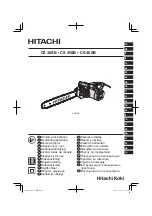
EN
‐
8
PATRIOT
2.
Filling
the
oil
tank
The
chain
saw
must
never
be
operated
without
sufficient
oil
on
the
chain
as
this
could
cause
damage
to
the
chain,
blade
or
motor.
No
claims
for
guarantee
can
be
accepted
if
damage
occurs
when
the
device
is
being
operated
without
chain
oil.
Please
use
only
biologically
‐
based
chain
saw
oil,
i.e.
oil
which
is
100%
biologically
decomposable.
Biological
chain
saw
oil
should
be
available
at
any
local
specialist
dealer.
Do
not
use
old
oil.
This
will
damage
the
chain
saw
and
will
also
lead
to
loss
of
the
guarantee.
Before
filling
the
oil
tank,
pull
plug
out
the
mains.
Open
the
oil
tank
cap
(3,
Fig.
3
‐
F)
and
place
the
sealing
ring
safely
aside
so
that
does
not
get
lost.
Fill
approx.
90
ml
oil
into
the
tank
using
a
funnel
and
screw
on
the
tank
cap
tightly.
The
oil
level
can
be
seen
in
the
oil
inspection
window
(1,
Fig
3
‐
F).
If
you
plan
not
to
use
the
machine
for
a
longer
period,
you
should
remove
the
chain
oil
from
the
oil
tank.
The
oil
tank
should
also
be
emptied
before
the
chain
saw
is
transported
or
dispatched.
Check
correct
functioning
of
the
chain
saw
lubrication
before
commencing
work.
Switch
on
the
saw
with
cutting
fittings
assembled
and
hold
over
a
bright
background
at
a
safe
distance
(Fig.
3
‐
F).
Be
careful
not
to
come
in
contact
with
the
ground!
An
track
of
oil
will
show
you
that
the
chain
is
sufficiently
lubricated.
After
use,
lay
the
chain
saw
horizontally
on
some
absorbing
surface.
The
oil
spread
on
the
bar,
chain
and
drive
may
lead
to
some
further
dripping
of
oil.
3.
Connecting
the
chain
saw
We
recommend
to
operate
the
chain
saw
in
connection
with
a
residual
current
operated
device
(RDC)with
a
maximum
breaking
current
of
30mA.
This
device
is
designed
to
be
operated
on
a
mains
supply
with
a
system
impedance
Z
max
at
the
point
of
connection
(house
service
connection)
of
max.
0.4
Ohm.
The
user
must
ensure
that
the
device
is
only
operated
on
an
electricity
supply
system
meeting
these
requirements.
If
required,
system
impedance
data
may
be
obtained
from
the
local
public
utility.
Use
only
extension
cords
that
are
approved
for
out
‐
door
use
and
are
not
lighter
than
rubbersheathed
cables
of
type
H07
RN
‐
F
with
a
diameter
of
at
least
1,5
mm
2
and
lenght
max.
50
m.
When
using
a
cable
drum,
the
cable
must
be
fully
unwound.
Supply
and
extension
cords
regularly
checked
for
wear.
If
the
connection
cable
of
this
device
should
be
damaged
it
must
be
replaced
by
a
workshop
named
by
the
manufacturer
only
as
this
work
requires
the
use
of
special
tools.
Do
not
use
damaged
extension
cord
and
replace
it
with
a
new
one.
To
protect
the
connection
cable
from
strains
this
chain
saw
is
equipped
with
a
strain
relief
(15).
First,
connect
the
tool’s
plug
with
the
mains
cable.
Then,
form
a
tight
loop
with
the
connection
cable
and
put
this
loop
through
the
opening
on
the
rear
side
of
the
handle.
Put
the
loop
over
the
strain
relief
hook
as
shown
in
the
corresponding
figure
3
‐
A.
Now
the
plug
‐
connection
is
secured
against
unintentional
disconnection.
4.
Switching
on
and
off
(Fig.
3B,
3E)
Hold
the
saw
securely
with
both
hands
so
that
the
thumbs
and
fingers
are
wrapped
around
the
handle
of
the
chain
saw
(Fig.
3
‐
E).
Check
that
the
chain
or
bar
are
not
touching
anything
and
nothing
can
hinder
their
free
movement.
Press
with
your
thumbs
the
safety
button
(13)
on
the
left
side
of
the
rear
handle
and
then
the
operating
switch
(9).
The
safety
button
(13)
is
used
for
unlocking
the
switch
‐
on
mechanism
and
does
not
need
to
be
pressed
after
the
device
is
switched
on.
To
switch
off
the
device,
release
switch
(9).
Warning:
The
sawing
chain
will
start
running
at
high
speed
immediately.
When
putting
the
saw
down,
make
sure
that
the
chain
never
gets
in
touch
with
stones
or
metal
objects.
Warning:
Keep
bystanders
and
animals
out
of
the
work
area
when
working
with
the
electric
chain
saw.
Summary of Contents for ES 180
Page 2: ...i ...
Page 3: ...ii ...
Page 5: ...iv ...
Page 6: ...v ...
Page 22: ...CZ 16 PATRIOT ...
Page 38: ...SK 16 PATRIOT ...
Page 54: ...EN 16 PATRIOT ...
















































